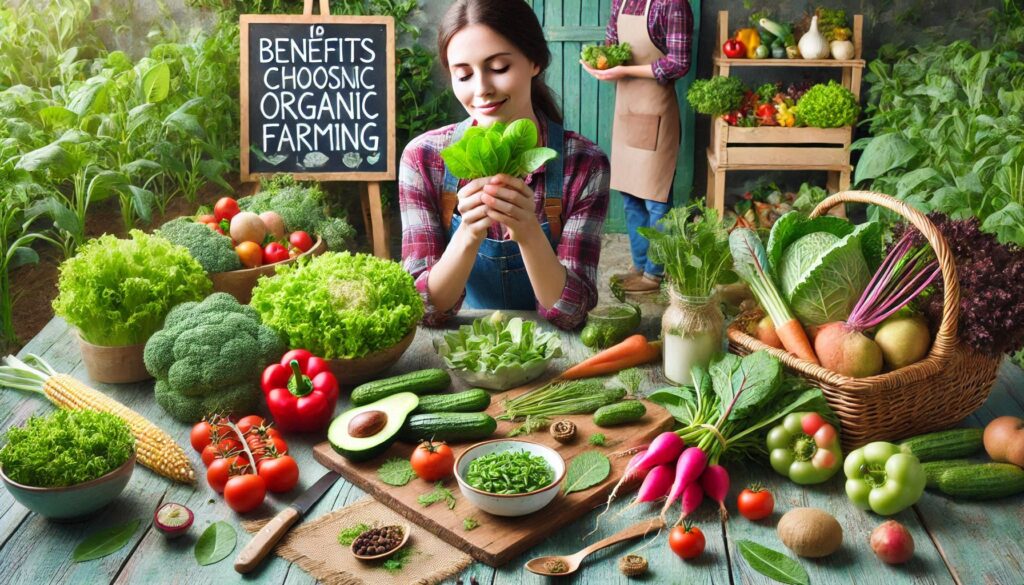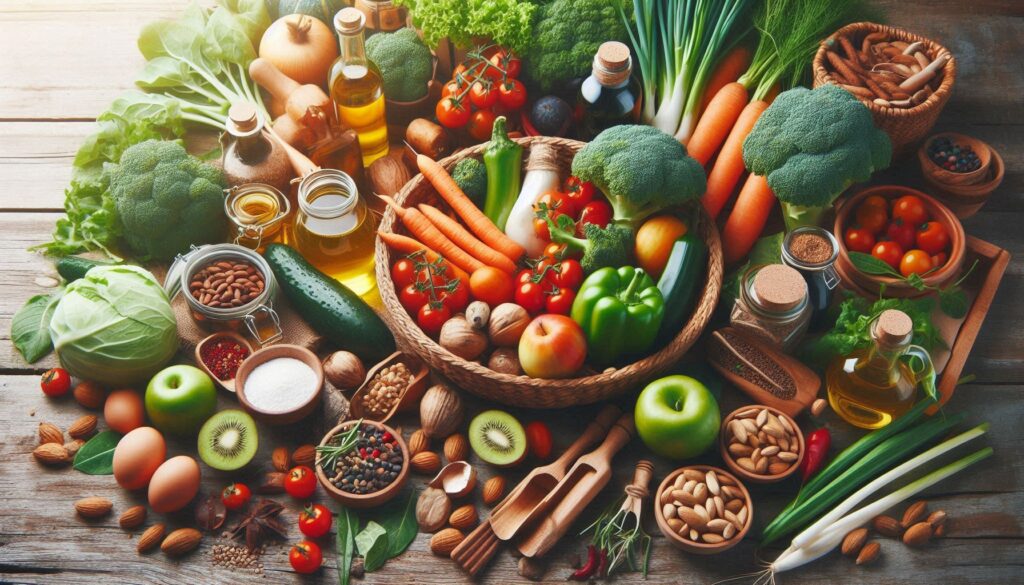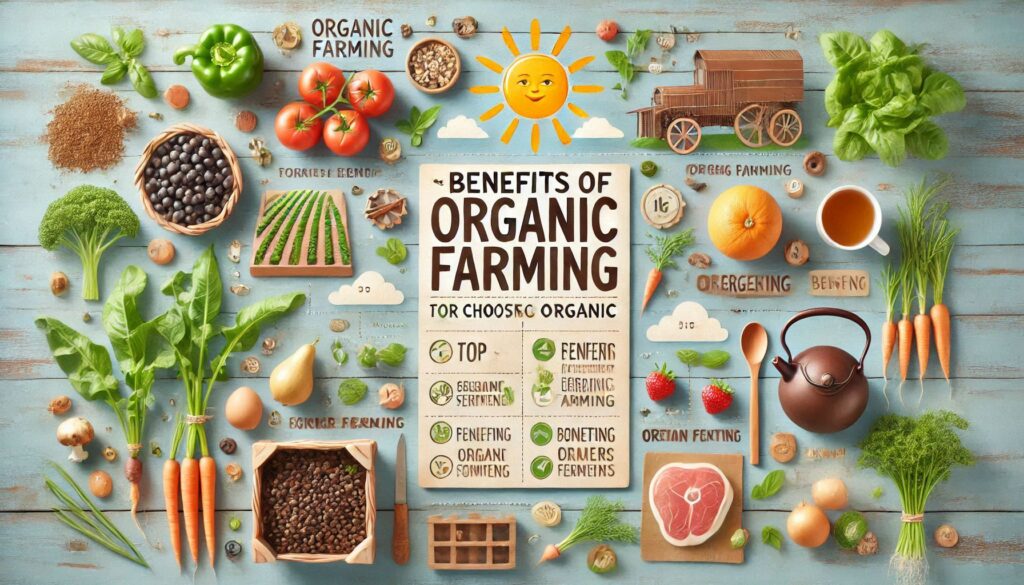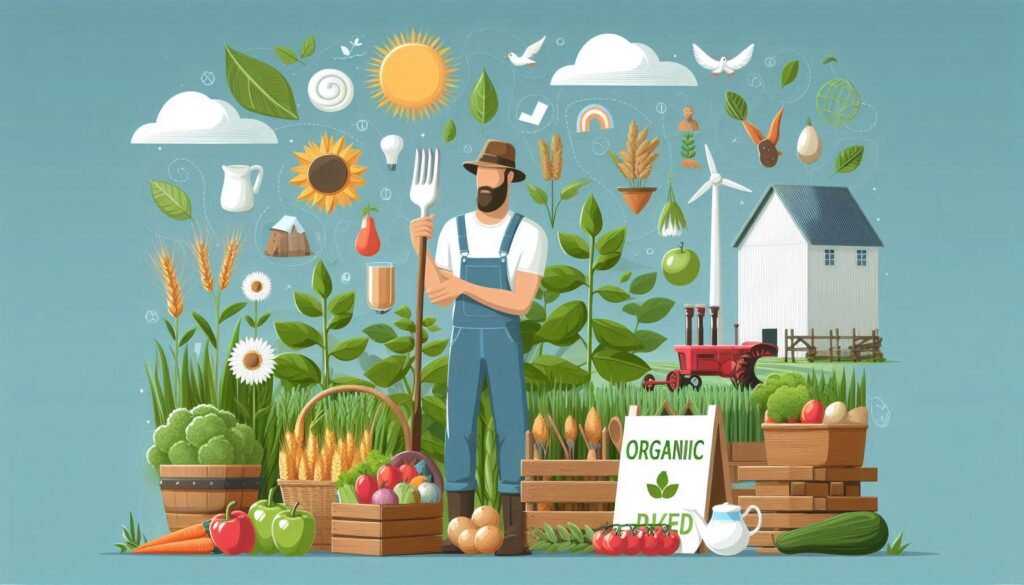
Organic farming is more than just a trend—it’s a lifestyle and agricultural practice that offers numerous advantages for individuals, communities, and the planet. By rejecting synthetic chemicals and embracing natural processes, organic farming delivers a range of benefits that extend far beyond the farm. In this blog, we’ll explore the top 10 benefits of choosing organic farming.
1. Healthier Food for Consumers
Organic farming produces food that is free from synthetic pesticides, herbicides, and genetically modified organisms (GMOs). As a result, consumers enjoy:
- Nutrient-Rich Produce: Organic crops often contain higher levels of vitamins, minerals, and antioxidants.
- Chemical-Free Consumption: Reduced exposure to harmful residues linked to conventional farming methods.
Key Takeaway: Organic food supports better health and lowers the risk of chronic illnesses.

2. Enhanced Soil Health
Healthy soil is the foundation of organic farming. Practices like composting, crop rotation, and reduced tillage help maintain soil fertility and structure.
- Natural Fertility: Organic matter, such as compost, enriches the soil.
- Microbial Activity: Promotes beneficial microorganisms that enhance nutrient cycling.
Key Takeaway: Organic farming restores and sustains soil health for long-term agricultural productivity.
3. Reduced Environmental Pollution
Conventional farming often relies on synthetic chemicals that pollute water, air, and soil. Organic farming eliminates these risks by:
- Avoiding Pesticides: Protecting water sources and aquatic ecosystems from contamination.
- Minimizing Erosion: Techniques like cover cropping and mulching prevent soil degradation.
Key Takeaway: Organic farming protects natural resources and promotes cleaner ecosystems.
4. Promotes Biodiversity
Organic farms are thriving ecosystems that support a variety of plants, animals, and microorganisms. Techniques like intercropping and agroforestry encourage biodiversity.
- Wildlife Habitat: Organic farms provide safe environments for pollinators and other beneficial species.
- Crop Diversity: Reduces pest outbreaks and fosters ecosystem resilience.
Key Takeaway: Organic farming fosters balanced ecosystems and protects endangered species.
5. Climate Change Mitigation
Organic farming helps combat climate change by reducing greenhouse gas emissions and sequestering carbon in the soil. Key practices include:
- Carbon Sequestration: Building organic matter in soil captures carbon dioxide.
- Energy Efficiency: Organic farms use fewer fossil fuels compared to conventional operations.
Key Takeaway: Organic farming contributes to a healthier planet by addressing global warming.

6. Better Animal Welfare
Organic farming ensures humane treatment of livestock by providing:
- Natural Living Conditions: Access to pasture and outdoor spaces.
- Chemical-Free Feed: Livestock consume organic feed, free from antibiotics and hormones.
Key Takeaway: Organic farming prioritizes the ethical treatment of animals.
7. Stronger Local Economies
Organic farming supports local markets and strengthens communities by:
- Boosting Small-Scale Farms: Encouraging diverse, family-owned operations.
- Higher Market Value: Organic products often command premium prices, benefiting farmers.
Key Takeaway: Organic farming supports local food systems and boosts rural economies.
8. Safer Working Conditions for Farmers
Organic farming eliminates the use of hazardous chemicals, reducing risks for farmworkers.
- Health Protection: Farmers avoid exposure to toxic pesticides and fertilizers.
- Sustainable Practices: Promotes long-term well-being for farming communities.
Key Takeaway: Organic farming ensures healthier, safer environments for agricultural workers.
9. Long-Term Sustainability
Organic farming is built on principles of sustainability, ensuring that resources are preserved for future generations.
- Renewable Practices: Organic methods emphasize renewable inputs and energy efficiency.
- Ecosystem Restoration: Organic systems rebuild degraded landscapes.
Key Takeaway: Organic farming creates a resilient and sustainable food system.
10. Consumer Empowerment
Choosing organic products empowers consumers to make a positive impact on the environment and their health.
- Transparency: Organic certification guarantees adherence to strict standards.
- Ethical Choices: Consumers support practices that align with their values.
Key Takeaway: Buying organic fosters a culture of informed and responsible consumption.
Conclusion
Organic farming offers a holistic solution to many of the challenges facing modern agriculture. From healthier food and soil to environmental protection and ethical practices, the benefits are undeniable. By choosing organic, farmers and consumers alike contribute to a sustainable future that prioritizes health, ecology, and fairness.

Here are the top questions to ask people on organic farming, and related topics
Here are concise answers to the questions:
1. How does organic farming contribute to producing healthier food compared to conventional farming?
Organic farming avoids synthetic chemicals and GMOs, resulting in nutrient-rich, pesticide-free food with higher antioxidants.
2. What practices in organic farming help maintain and enhance soil health?
Practices like composting, crop rotation, and reduced tillage boost soil fertility, structure, and microbial activity.
3. In what ways does organic farming reduce environmental pollution and protect ecosystems?
By avoiding synthetic pesticides and fertilizers, organic farming prevents water and soil contamination and minimizes erosion.
4. How does organic farming promote biodiversity on and around farms?
Techniques like intercropping and agroforestry create habitats for wildlife, encourage pollinators, and reduce pest outbreaks.
5. What role does organic farming play in mitigating climate change and reducing greenhouse gas emissions?
Organic methods sequester carbon in the soil, use less fossil fuel, and promote energy-efficient farming practices.



Pingback: Why Organic Farming Is Better Than Conventional(2025) - Agricultural